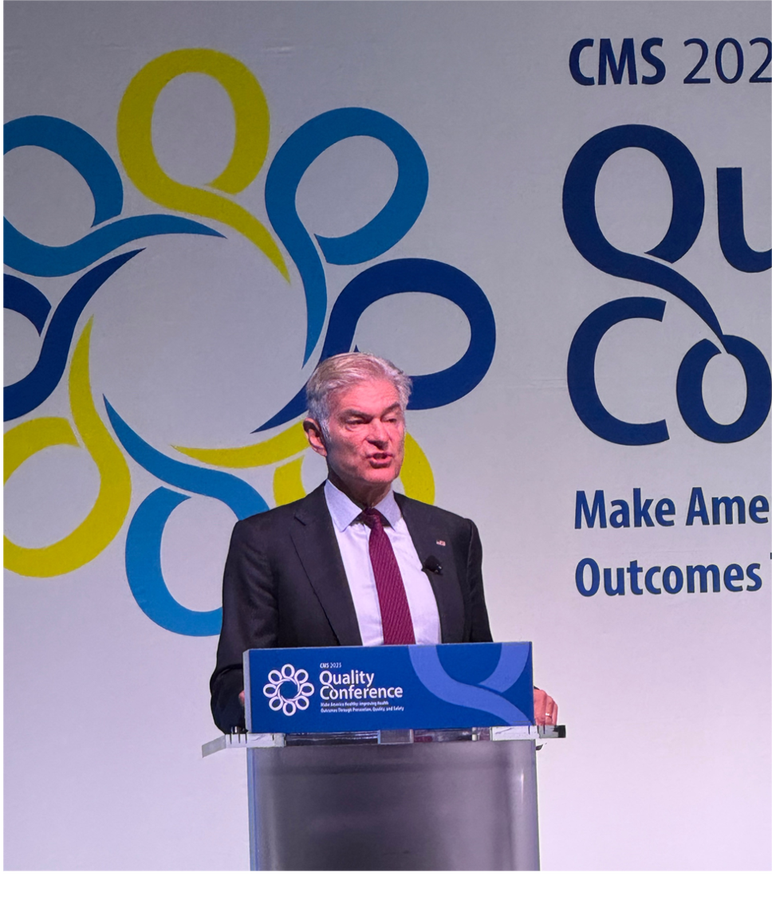CMS administrator Dr. Mehmet Oz speaks to the agency’s 2025 Quality Conference in Baltimore
With the skill of a veteran heart surgeon reassuring patients facing a life-changing procedure, Dr. Mehmet Oz projected calm continuity to the nearly 10,000 in-person and online individuals registered for a major conference by the agency he heads, promising to take care of “the vulnerable among us” in concert with the “incredible” staff at the Centers for Medicare & Medicaid Services.
That same day and just hours apart, Oz managed to persuade nervous House Republicans that the Medicaid cuts in President Trump’s One Big Beautiful Bill, which Oz had called “the most ambitious health reform bill in history,” would not severely impact their constituents and thereby threaten the continuity of their jobs. Two days later, the bill squeaked by the House and went to the president for his signature.
The purposeful absence of politics at a moment of intense political turmoil often gave the 2025 CMS Quality Conference, whose record attendance reflected widespread uncertainty about a new administration, the feeling of being cut off from the real world. Still, Oz did allude to “a lot of things that happened before I was administrator” – presumably the disruptive reductions in the workforce orchestrated by the Elon Musk-led Department of Government Efficiency – before asserting that CMS was “moving into growth mode. We want to take chances. We have a wonderful team.”
(Later that day, a federal judge ruled that the layoffs of an estimated 10,000 staffers at HHS were likely illegal and granted a request to block them.)
Energizing the Agency in Tough Times
One way Oz has sought to energize that team is by regular walk-throughs at the agency’s Baltimore headquarters, where workers often ask the charismatic former TV star for selfies. “Sometimes, he’ll even hold the camera,” one mid-level employee told me.
Absent selfies, but still cool and charismatic, Oz commanded the stage at this conference to re-emphasize his goals of empowering patients, rooting out fraud and abuse and embracing digital technology such as artificial intelligence in order to improve the cost-effectiveness and quality of U.S. health care. There was, of course, also a promise to help Health and Human Services Secretary Robert F. Kennedy Jr. steer the health care system away from its sickness-care emphasis towards a greater focus on prevention and wellness. Moreover, given warnings that the Medicare trust fund could run out within eight years, the urgency of cost control was also prominent.
Interestingly, and appropriately for an agency that controls a staggering $1.5 trillion in health care expenditures and affects the care of one in two Americans, Oz said he planned to utilize a management approach popular in corporate America. That approach is known as “OKRs,” or “objectives and key results.”
Still, difficult times could lie ahead. The nonpartisan Congressional Budget office estimated that the reconciliation bill just passed into law would cut Medicaid by 15%, or $1 trillion over 10 years, and cause almost 12 million Americans to lose their health insurance. According to STAT News, the legislation would also require “significant administrative work by CMS and states on issues like work requirements and enrollment in Affordable Care Act plans.” Those burdens come at a time when HHS has closed half its regional offices, many experienced employees have left CMS and the agency is struggling with severe budget constraints.
Highlighting Patients
Although I didn’t hear anyone from CMS utter the word “equity,” Oz began his remarks by pointedly citing the words of Hubert H. Humphrey that are engraved on a lobby wall in the HHS headquarters building that bears Humphrey’s name: “We are judged all of us by how we take care of those who are struggling, the vulnerable among us.”
Said Oz, “That’s the resounding theme of my first few months of my tenure at CMS.”
The four-person panel Oz moderated reinforced the digital health and patient empowerment themes. Epic Systems president Sumit Rana, who leads the dominant electronic health record company, was joined by Dr. Brian Anderson, chief executive officer and co-founder of the Coalition for Health AI (CHAI), which is developing best practice guidelines for AI use I in health care.
The two other panelists were both moms who’d spent years fighting for safe, high-quality care for a child with serious health issues. Both had strong policy backgrounds and were also entrepreneurial. Both also utilized digital resources to protect their child.
Susan Sheridan’s son Cal was left with brain damage caused by jaundice as a result of a diagnostic error at birth. That devastating experience, and a separate medical error that ended with the death of her husband, Pat, led Sheridan to both serve in government and advocate outside government for law and policy changes. Most recently she was a co-founder of Patients for Patient Safety US. (Disclosure: I’m an active member of the group.)
On both a personal and professional level, I was thrilled to see Sue on the panel. I admired how she recently used ChatGPT and OpenEvidence to prevent a medication error that threatened Cal, while also wincing at how hard she’s had to work to keep him safe. When she declared that paying for bad care is “fraud,” and that “we [patients] have to have the same access to information that the doctors have,” I inwardly applauded.
Meanwhile, Amy Gleason’s daughter, Morgan, was diagnosed as a child with juvenile dermatomyositis, a rare immune disease. Amy has also been entrepreneurial in the public and private sector, including founding a company called CareSync to enable patients with complicated conditions to access all their medical information in one place.
I vividly remember Morgan Gleason speaking at a meeting some years back about having to manage information from nearly two dozen different patient portals while trying to live a normal 22-year-old’s life. At a separate meeting, Amy presented powerfully about CareSync. (Unfortunately, the company did not succeed.) On this CMS panel, Amy Gleason described loading Morgan’s medical record into an AI chatbot after her daughter was ruled ineligible for a promising clinical trial. The AI found a small diagnostic mistake in the record that, when corrected, made Morgan eligible and won her a coveted spot.
Gleason may be more well-known, however, for her return to public service as acting administrator of DOGE. At this conference, she was also listed as a “strategic advisor” to the CMS Administrator.
Like Sheridan, Gleason, too, urged giving patients both more and more usable access to their data, through apps and agentic AI.
Deeds, Not Words
The phrase, “Deeds, not words,” was a favorite saying of George Washington. At this conference, there were many thought-provoking and even inspiring words about improving care quality, safety and patient-centeredness. Oz himself has previously promised to “empower” the American people to “better manage their health and to hold providers “accountable for health outcomes.”
Whether the deeds done in the city named in our first president’s honor match the words, however, remains to be seen.









